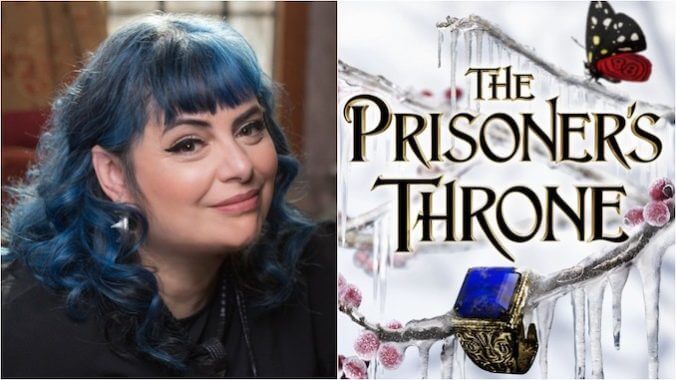Holly Black Talks The Prisoner’s Throne, Prince Oak’s Journey, and Writing a More Mature Jude and Cardan

Author Holly Black is one of the most popular writers in the world of fantasy fiction today. And, with good reason—in a publishing landscape saturated with stories about faeries and the lush, magical realm they inhabit, there’s still nobody that’s doing it like her. Her books are lushly imagined and meticulously plotted, featuring fascinating, frequently morally gray characters and stories shot through with more than a little fear. Her mega-popular Folk of the Air trilogy—The Cruel Prince, The Wicked King, and The Queen of Nothing—was a New York Times bestselling series that captivated millions of readers around the world and while its follow-up The Stolen Heir shifted its focus to the series’ younger generation of characters, it was certainly no less compelling an adventure.
With sequel The Prisoner’s Throne, Black turns her Stolen Heir series into a true duology, switching things up to tell the second half of its larger story from Oak’s perspective and using its narrative to shed fresh light on both his motivations and some of the events we saw take place in the first book. While its story begins with Oak as a prisoner in Wren’s Ice Needle Citadel, its scope slowly expands until it encompasses from the court of Elfhame to the politics of the Undersea. And in returning to Elfhame, it gives us a chance to spend some time with Cruel Prince fan favorites Jude and Cardan, now almost a decade into their reign, and a bit more world-weary than the last time we saw them.
The Prisoner’s Throne is a story of many things: The fate of a magical kingdom. The difficulties of deciding what kind of person you want to become. The complexities of family, both blood and found, and what it means to love someone more than yourself. And a story that will delight those who can’t get enough of the world of Faerie, with all its dark corners and complicated intrigue.
We got the chance to chat with Black herself about this latest installment in her Folk of the Air series, moving away from Wren’s point of view, writing a more mature version of her most famous OTP, and more.

Past Magazine: Surprise! The Prisoner’s Throne switches to Oak’s POV. What made you want to tell this story from two different viewpoints in the two books, versus the way that the Folk of the Air series sticks with Jude?
Holly Black: When I was considering writing a duology, I was interested in exploring what kind of different narrative constructions that the format suggested. I have really enjoyed stories that start with one point of view and end in the other, especially one where there are lots of questions around what the person into whose head we don’t see is thinking/feeling. And so I decided that if I was going to a duology I was going to challenge myself to have half of it be Wren’s story and half be Oak’s.
This was especially important to me because both of them internalize so much that I think they’re very different characters once you have access to their innermost thoughts and fears.
Paste: I will admit, it did take me a bit to get used to feeling so removed from Wren after spending all of The Stolen Heir with her. It ultimately makes sense as to why she can’t be our POV character in this story, but was it hard for you, as the person writing her, to kind of distance yourself from her for the sake of this story?
Black: It was tricky to write a book from Oak’s point of view in which we need to see Wren’s story—one we’ve been inside—play out in a way that was satisfying.
There’s always going to be some level of disorientation in terms of suddenly not having access to her thoughts and feelings, but I hope it came with a pleasure in getting to see them both from inside their heads and also from some distance.
-

-

-

-

-

-

-

-

-

-

-

-

-

-

-

-

-

-

-

-

-

-

-

-

-

-

-

-

-

-

-

-

-

-

-

-

-

-

-

-








































